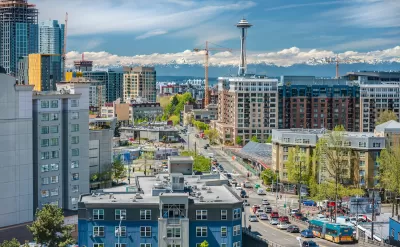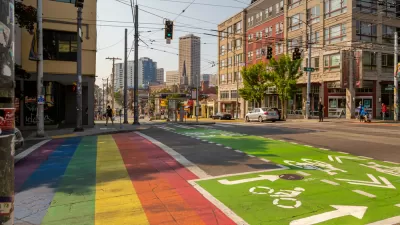Charging developers for improving local infrastructure impacted by their projects could boost transportation revenue, but permit applications in the city are slowing down.

he Seattle city council is once again weighing a proposal to institute transportation impact fees, which would impose a charge on new developments that would fund transportation improvements.
As Ryan Packer explains in The Urbanist, these fees are aimed at mitigating the impacts on local infrastructure and roads caused by new projects. “Transportation impact fees, a tool authorized by the state legislature as part of the Growth Management Act, are levied by more than 70 cities statewide but have never been used in Seattle.”
However, “the issue of adding additional fees on new housing during a well-identified affordability crisis is causing additional scrutiny of the idea.” The proposal is being appealed by a “shadowy group” called the Seattle Mobility Coalition, which claims that the city skimped on its environmental review of proposed development impact fees. As Packer notes, “an impact fee that discourages housing growth in Seattle, making sprawl more cost-competitive and drives up commute times would put more demand on the region’s transportation system overall, defeating the entire purpose of the impact fee program.”
Supporters of the fee see it as a replacement for revenue from the Move Seattle transportation levy, which expires next year. Meanwhile, development permit applications are slowing down, with a 62 percent decline in applications in the second quarter of 2023 from the previous year.
FULL STORY: Seattle Council Pushes Forward on Transportation Impact Fees

Montreal Mall to Become 6,000 Housing Units
Place Versailles will be transformed into a mixed-use complex over the next 25 years.

Planetizen Federal Action Tracker
A weekly monitor of how Trump’s orders and actions are impacting planners and planning in America.

California High-Speed Rail's Plan to Right Itself
The railroad's new CEO thinks he can get the project back on track. The stars will need to align this summer.

Nevada Legislature Unanimously Passes Regional Rail Bill
If signed by the governor, the bill will create a task force aimed at developing a regional passenger rail system.

How Infrastructure Shapes Public Trust
A city engineer argues that planners must go beyond code compliance to ensure public infrastructure is truly accessible to all users.

Photos: In Over a Dozen Cities, Housing Activists Connect HUD Cuts and Local Issues
We share images from six of the cities around the country where members of three national organizing networks took action on May 20 to protest cuts to federal housing funding and lift up local solutions.
Urban Design for Planners 1: Software Tools
This six-course series explores essential urban design concepts using open source software and equips planners with the tools they need to participate fully in the urban design process.
Planning for Universal Design
Learn the tools for implementing Universal Design in planning regulations.
City of Camden Redevelopment Agency
City of Astoria
Transportation Research & Education Center (TREC) at Portland State University
Municipality of Princeton (NJ)
Regional Transportation Commission of Southern Nevada





























